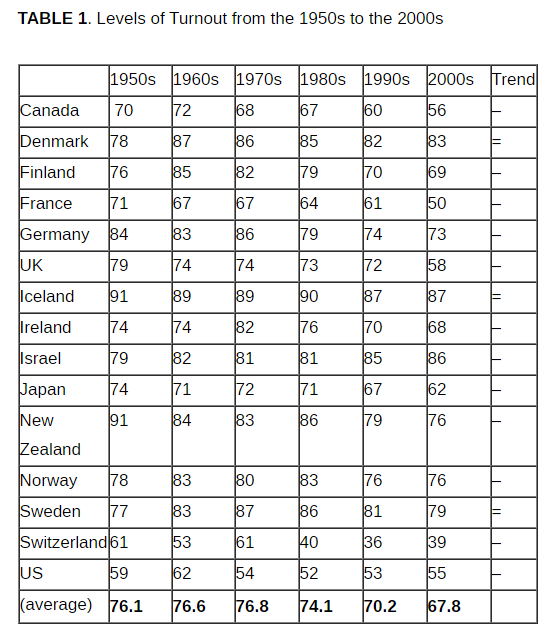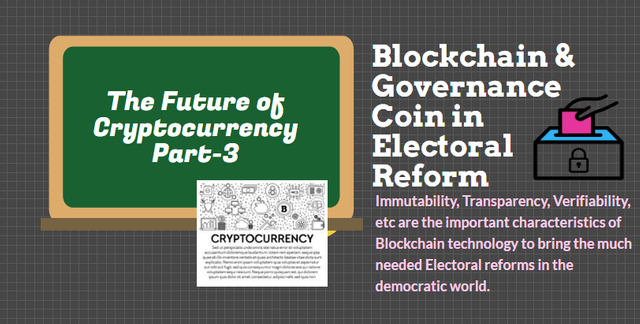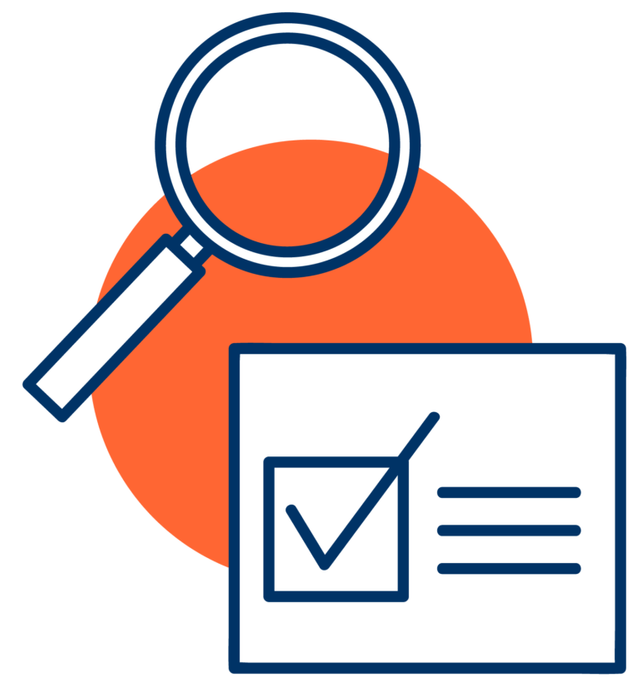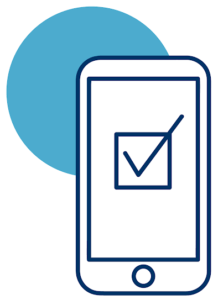The Future of Cryptocurrency: Part 3: Blockchain in Electoral Reform
The very basis of Governance starts from electing a Govt in Democracy. By principles, it says you all have your say in choosing a Govt. While that may sound sacrosanct in its first place, it may not be that simple in reality when we elect a Govt.
There has been a social distrust as far as the Democratic process & electoral system is concerned and this is true for the entire democratic world. The political distrust from the citizens' perspective needs to be evaluated and should be gauged upon with a transparent, fair, equitable, effective, scalable electoral system.
The existing electoral system should leverage technology like Blockchain to make it fair, transparent & acceptable for all to make sure that public desires are fulfilled. Blockchain technology complies with democratic principles fundamentally.
In the ongoing week of #steemcryptochallenge, I have already published Part 1 & Part 2 of The Future of Cryptocurrency. Today's publication will deliberate on how Blockchain technology can bring the much needed Electoral Reform for the Democratic World.
Remodelling Democracy with Blockchain technology
You should have a say in choosing a Government, but technology must also be at your disposal to make it easy for you, make it one-click for you, sitting at the comfort of your home.
Existing Problem Interface
1. Participation Rate
To strengthen the democracy of a democratic world, we also need a better participation rate, otherwise, the elected representatives will not be a true representation of the process & the people.
With technological evolution & rapid transformation of the processes and system in exercising democracy, it is expected to witness a better participation rate at least better than the pre-industrial era. But that has not been the case as per the data. The voter turnout all-across the democratic states has been constantly vanishing.

The same has been the trend in developing countries as well.
Another important point to note is that our vote is not mobile, it is homebound because we can only vote in that polling station where we primarily belong, does not matter whether we are participating in National Election, or State Election, or Local Election. That is where the majority of the voter turnout diminishes.
For livelihood, migrant workers have to travel to a different state, and at the time of voting, it is very difficult for them to return to their locality and cast a vote. As that will incur travel cost, time, and other inconveniences. The cost-benefit analysis does not attract such voters to return to their native place and participate in the democratic processes. As a result, the voter turnout diminishes.
In a country like India, the seasonal and temporary migrant population is as high as 400 million.
In the 21st century, we can't expect the people to stand in a long queue to cast a vote and participate in democracy. In particular, it will not attract the youth.
The eligibility to vote and participate in democracy is set at 18 years. But the kind of maturation at 18, understanding the democracy, making a wise political choice may not bode well with an age like 18, we don't have any such provision to delegate the voting power either. That also adds to the lower voter-turnout to some extent.
2. Less/No Accountability
The election generally happens every 4/5 years. The voters who have elected a representative have very little margin to hold him accountable for the role/job he has undertaken.
The failure of political representation on breaking promises also adds to social & political distrust.
Further, in the existing setup, the only way to hold an elected representative accountable is through the next voting, next election. Considering a span of 5 years is too much for the voters to remember the events, and the politicians often find an easy escape.
3. Lack of reliable mechanism to validate the Electoral process
In mass elections where millions participate to elect Prime Ministers or Presidents, it is necessary to have a standard reliable mechanism to validate the electoral process and must ensure the legitimacy of the system, in a way that is acceptable for all.
Be it Paper Ballot or Electronic Voting Machine, we have had reports of inconsistencies, tampering, and irregularities in the counting of votes which raises many eyebrows on the authority as well as the mechanism that is in place. It is not limited to any one country, not even limited to a discourse of ruling/opposition parties. It is a matter of grave concern for all, particularly when technology is advancing at a faster rate. We still have this grey area.
Even though the political culture of one country differs from the other, which also includes micro-variants, many other things empirical to the geography, it is the lack of a reliable mechanism that undermines democracy all across the globe.
4. Democracy(without provision of Delegating influence) is a "number game" only, counter-productive to democracy
Just imagine an exercise of democracy in a group of 100 people, out of which 90 people happen to be thieves or malicious elements, and the rest 10 are honest and wise people. In a fair & equitable democracy, each one will cast one vote and the majority will rule the Govt. So, in this case, malicious power will rule the Govt.
Take another example, there are 100 people, out of which 70 happen to have attained 18 years of age recently, just entered adulthood, eligible for voting. The remaining 30 are intellectuals & are matured enough as adults, their understanding of political engagement is better, they know the issues of society better. So their intelligence is better than the majority (70) who have just become eligible to vote. But with this equation, the inexperienced, naive will be voted to power. So even though it goes through the democratic process, the democratic objective will not be achieved.
The existing democratic processes and systems do not have provisions to use the intellectual mind, because one does not have the power to delegate his influence to an intellectual who can make a better decision(on behalf of the naive voter) in choosing a better Govt. Just imagine if there is a provision of "delegation", then the naive voters will delegate their influence power to the intellectuals to elect the right candidate. With that, both the democratic process & democratic objective will be fulfilled.
Blockchain technology, Governance coin as a solution
Let's remodel and re-design the democratic processes with Blockchain technology.
The authorities first issue the Voter Card or similar identity verification to the respective voters who are eligible for voting. In the first place, the Election Commission has the number of voters who are eligible to vote in this election year.
Then a ledger powered with Blockchain technology can be enabled to store the data and issue the Governance coin. An algorithm can be created to mint the Governance coin equivalent to the number of eligible voters for the Election year.
- The Governance coin does not have any monetary value.
- The Governance Coin can not be transferred.
- The Governance coin can be used once in the Election year to cast vote.
- The influence of the Governance coin is time-limited (until the next election).
- The Governance coin can be delegated to another voter.
The vote with this system in place should be mobile, and with multiple options:-
- By visiting the polling station
- By voting with Smartphone sitting at home
Decentralized applications should be deployed on top of Blockchain technology to enable voters casting vote with a Smartphone.
Generally, a voter visits the polling station, produces the voter identity card, and then cast his vote, receives the VVPAT(Voter Verifiable Paper Audit Trail).
Now the same voter can also be able to cast his vote sitting at home, a suitable video verification should be enabled for the voter, the eye, photos attached in the identity card can be matched with the person who appears in the video verification and then a set window should be offered to cast his vote.
With this, all the migrant workers will be able to participate in the democratic process, electing their Govt. More participation always strengthens democracy and its principles.
The youth participation will also improve when they find themselves participating in a democratic process sitting at the comfort of their home and with their smartphones.
The algorithm created to mint Governance tokens(fixed in numbers), issued to the voters, and its delegation, counting, etc, all can be verified by third parties. As it is powered with Blockchain technology, it is fully secure, encrypted, immutable(most important in the context of voting).
With the feature like Delegating your voting power to another voter, the intellectuals of the society can play a bigger role in helping the nation choosing the right candidate, the public discourse, the debate can be deliberated with new hope & enthusiasm with the "delegation" feature.
Just imagine, when the naive voters, especially those who have just attained 18, become eligible to vote but don't have any idea and understanding on the social-political turf of the country can delegate their governance coin to the one who knows better than them.
Furthermore, the counting of votes will not just be fair but also quite fast & scalable, there won't be any such concept as recounting, everything will be automated. Suitable dApps should be allowed to deploy on the top of the Blockchain, to ensure that there is no doubt and confusion among the various political parties.
When fair, equitable voting alongside intellectual voting will happen it will strengthen both democratic processes and democratic objectives.
Pros & Cons
Pros
- Highly secure, immutable voting, tampered-proof.
- Verifiable by third parties.
- Fully automated process to count the votes.
- Saves a lot of time and cost.
- Makes it easy, attracts the attention of Millenials.
- The voter-turnout will dramatically improve.
- The intellectual will be able to play a bigger role to build the Nation with the feature like "Delegation" of Governance coin.
- The risks of EVM tampering, inconsistencies in counting can be mitigated.
- A vote can be as mobile as a Smartphone.
Cons
- The corrupt/Malicious elements in the Govt Machinery will still try to enroll the ineligible voters for instant gratification at the time of issuing voter identity cards.
- The delegation feature can very well be manipulated by inveiglement with money, exploiting people with the poor economic situation, offering them money, and making them delegated to fake intellectuals.
Conclusion
While improvement is a continuous process, reform may not be, because for that we may at times need something out of the box and from a third reference to make deep-rooted reform, addressing the various existing problem interfaces.
The advanced researches and studies have already recognized the tangible benefits of Blockchain technology beyond its application as crypto.
If we ever need a reform in the existing electoral system then we would need something that is immutable, that is transparent, that is verifiable by a third party, that is secure. Blockchain has got all these important characteristics to make the deep-rooted reform of the existing Electoral system and most importantly it has the potential to make your vote as mobile as your Smartphone.
Thank you.
Cc:-
@steemitblog
@steemcurator01
@steemcurator02




.png)
.png)

So it's ideal to say that the future of cryptocurrencies basically starts from the government we chose to govern us.
And another is technology. Technology has a major role to play in deciding the future of cryptocurrencies before it comes down to other factors.
I agree but this doesn't stand solid in a country that still doesn't appreciate the benefits of cryptocurrencies.
❤️❤️❤️❤️
Becky.
Many countries have recognized Blockchain but they are reluctant to accept crypto as one of the applications. In my country, our PM has recognized the potential of Blockchain as a technology, but yet to bring any law to regularize crypto. Even the Army chief once said, they will experiment with Blockchain technology in Arm deals, which we generally buy from other developed countries.
So I see Blockchain use in many areas bypassing crypto. Not to mention crypto is just one of the many uses of Blockchain.
Thank you.
We need massive educative initiatives to make everyone aware of the abilities of blockchain technology. Just take our own country India for example. The majority of the population still cannot differentiate between blockchain and cryptocurrency.
The government itself has made several announcements stating that they will explore the capabilities of blockchain. However, I haven't heard of any major development in our country particularly.
So, I feel that the very first move towards having these useful functionalities such as voting using the blockchain should be to educate people.
The easiest way to do that is to use a platform such as steemit itself. The wealth of knowledge that can be found on this decentralized blogging platform is truly remarkable.
Deploying the decentralized voting system once the majority of the population is well educated is when we can see this being widely appreciated.
Probably a combination of both blockchain-based voting and the existing secrete ballot system in the beginning just to ease into the system would also help greatly.
This single advantage can do marvels to a democratic nation. Imagine not having to wait for several days just for the votes to get counted. Would really be an amazing future. Great read!
Steem on
#twopercent #india #affable
Even we can start this as an experiment as an additional option alongside the existing setup(without disrupting), let's see how the contours develop, how well it is responded by the general public.
Further, education is also a continuous process, combining with natural evolution, the next generation will be better off to go with such things and they will also find it easy, and friendly, particularly the millennials.
Once upon a time in Banking operation were used to be with a typewriter, today everyone is well versed with a Computer and the Govt and Banks do not have to run a program to teach the new generation how to operate a computer, in a similar way the next generation will be well versed with Blockchain.
Thank you for stopping by.
I might disagree with you somewhat on the issue of intellectual voters and naive voters. I think every one should have equal right irrespective of your level of knowledge. Someone might know so much but still have some selfish interest as in the case in some parts of the world. Elections for me are best done in black and white especially in a country like Nigeria. If it goes digital, you're going to see a whole lot of malpractices related to disenfranchisement. While they may not alter vote counts, they can prevent people from voting with some technical means especially the naive ones they were unable to buy over.
For this to work, not only advancement in technology is needed but also some great level of sincerity, responsibility and transparency is required from the people in government.
#onepercent #nigeria
They will still have equal rights.
The proposition only adds an additional feature to delegate the power to someone else, completely at the discretion of the voter. It does take away any rights of anyone. All will have equal rights.
Thank you for joining.
A start-up company based in Melbourne Horizon State is trying to use blockchain technology, which is widely known in buying and selling bitcoin, to be used to help elections in Indonesia.
"If we use the blochchain to vote, just like with bitcoin transactions, then that vote cannot be changed anymore. So there is a trustworthy process against a system that is not controlled by one party, one organization, be it a government or an individual." said Jamie Skella, of the company Horizon State, which designed the platform to help make elections more transparent
Yes, the immutability feature will play an important role in Electoral reform.
Thanks.
Great to future of crypto currency. Thanks for sharing with us.
Thank you.
Congratulations you are one of the winners of the Steem Crypto Challenge Month...
Thank you for taking part
The Steemit Team
Thank you so much.
Steem on.